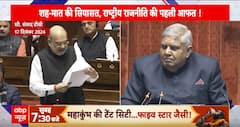How To Save Tax In India? Here's All You Need To Know About Tax Laws
In accordance with Income Tax Act, 1961, there are several effective strategies and provisions that can help taxpayers optimize their tax savings

By Adv. Aashish Sharma
Taxes are an essential part of a functioning society, as they provide the necessary funds for infrastructure development, public services, and social welfare programmes. However, it is also important for individuals and businesses to explore legal ways to save on their tax liabilities. In accordance with Income Tax Act, 1961, there are several effective strategies and provisions that can help taxpayers optimize their tax savings. In this article, we will explore some of the key methods to save tax in India while ensuring compliance with the country's tax laws.
Understand and Leverage Tax Deductions and Exemptions
Indian tax laws offer a variety of deductions and exemptions to individual taxpayers. It is crucial to be aware of these provisions and take advantage of them. Some commonly used deductions and exemptions include:
- Section 80C: Under this section, individuals can claim deductions on investments in instruments such as Employee Provident Fund (EPF), Public Provident Fund (PPF), National Savings Certificates (NSC), Life Insurance Premiums, and Equity-Linked Saving Schemes (ELSS), among others.
- Section 24(b): This section allows individuals to claim deductions on the interest paid on home loans, thereby reducing their taxable income.
- Section 10(14): Employees can avail tax exemptions on allowances such as House Rent Allowance (HRA), Leave Travel Allowance (LTA), and Medical Allowance.
Opt for Tax-Saving Investments
Investing in tax-saving instruments can help individuals reduce their tax liabilities while simultaneously building wealth. Some popular tax-saving investment options in India include:
- Equity-Linked Saving Schemes (ELSS): ELSS is a mutual fund scheme that offers tax deductions under Section 80C. It has the potential to generate higher returns over the long term.
- National Pension Scheme (NPS): NPS allows individuals to contribute towards their retirement and avail tax benefits under Section 80CCD(1B) over and above the limit of Section 80C.
- Tax-Saving Fixed Deposits: Banks offer tax-saving fixed deposits with a lock-in period of five years, providing tax deductions under Section 80C.
Maximize Home Loan Benefits
If you have taken a home loan, you can enjoy tax benefits on both the principal amount and the interest paid. Under Section 80C and Section 24(b), respectively, one can claim deductions on the principal repayment and the interest component of the home loan.
Utilize Income from House Property Effectively
If you own multiple properties, you can maximize your tax savings by utilizing the provisions related to income from house property. For instance, if you have a self-occupied property and another property that is let out, you can claim deductions for the interest paid on the home loan for the rented property without any upper limit.
Opt for Tax-Advantaged Retirement Plans
Contributing towards retirement plans such as the Employee Provident Fund (EPF), Public Provident Fund (PPF), or National Pension Scheme (NPS) can significantly reduce your taxable income. These retirement plans offer tax benefits during the contribution, accumulation, and withdrawal phases.
Plan Your Capital Gains
Capital gains arising from the sale of assets like stocks, real estate, or gold can attract taxes. However, by utilizing provisions like indexation benefit, reinvestment in specified assets, or capital gains exemption under certain conditions (e.g., investing in a residential property), you can reduce or defer the tax liability on capital gains.
Saving tax in India requires a thorough understanding of the tax laws and an informed approach to tax planning. By leveraging the various deductions, exemptions, and investment options available, taxpayers can legally minimize their tax burden while simultaneously building wealth and securing their financial future.
Remember, smart tax planning is not about evading taxes but rather making the most of the provisions provided by the government for the benefit of taxpayers and the overall economy.
The writer is the co-founder and litigation head at Lex N Tax.
[Disclaimer: The opinions, beliefs, and views expressed by the various authors and forum participants on this website are personal and do not reflect the opinions, beliefs, and views of ABP News Network Pvt Ltd.]
Trending News
Top Headlines






































